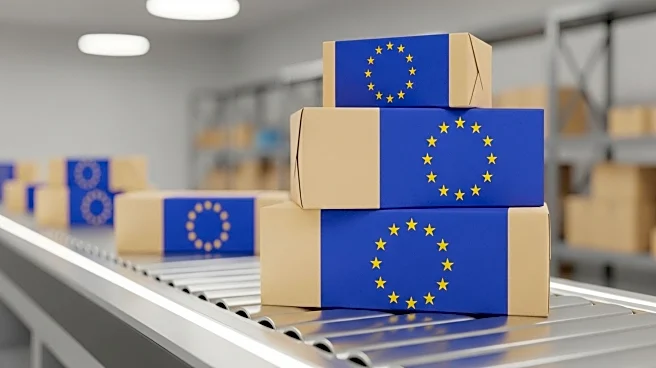What's Happening?
UK retailers are reportedly missing out on significant sales opportunities within the European Union due to apprehensions surrounding the cost and complexity of handling returns. According to Customs Support Group (CSG), a major customs broker operating across 14 European countries, many businesses are hesitant to expand into international markets due to fears of incurring double duty payments when goods are returned or remain unsold. This reluctance has contributed to a notable decline in UK exports to the EU since Brexit. Data from Retail Economics and Tradebyte indicates that UK footwear and clothing exports to the EU have plummeted from £7.4 billion in 2019 to £2.7 billion in 2023, marking a drop of over 60%. Nicola Haynes, a senior customs consultant at CSG, explained that goods crossing borders are subject to tax, even if returned, unless proven to be previously exported UK goods. CSG suggests that retailers can manage returns without additional tax through product tracking, automating returns via customs software, and utilizing Returned Goods Relief (RGR) to re-import goods without extra duties.
Why It's Important?
The decline in UK exports to the EU has significant implications for the retail industry, particularly in the fashion and footwear sectors. The complexity of managing returns and the associated costs are deterring retailers from tapping into lucrative EU markets, potentially stifling growth and profitability. The ability to effectively manage returns is crucial not only for enhancing customer experience but also for unlocking new markets without incurring unnecessary costs. By implementing robust tracking and visibility systems, retailers can streamline the returns process, mitigate risks, and ensure compliance with customs regulations. This approach could lead to increased international trade opportunities and improved financial performance for UK retailers.
What's Next?
Retailers are encouraged to adopt strategies that facilitate efficient returns management to overcome barriers to EU market expansion. By leveraging customs software and ensuring proper documentation, businesses can avoid additional duties and taxes, thereby enhancing their competitiveness in international markets. The insights from CSG align with findings in InternetRetailing's Returns 2025 Report, which emphasizes the critical role of returns management in profitability and international growth. As retailers seek to expand their reach, mastering returns processes will be essential for driving cross-border growth and maximizing sales potential.
Beyond the Headlines
The challenges faced by UK retailers in managing returns highlight broader issues related to international trade post-Brexit. The need for efficient customs processes and compliance with regulations underscores the importance of adapting to new trade environments. Additionally, the focus on returns management reflects a shift in retail strategies, where operational efficiency and cost management are increasingly prioritized to sustain growth in competitive markets.











